Media Test 2
5.0(1)
5.0(1)
Card Sorting
1/44
Earn XP
Description and Tags
Study Analytics
Name | Mastery | Learn | Test | Matching | Spaced |
|---|
No study sessions yet.
45 Terms
1
New cards
Who Controls the Media
Warner Brothers Discovery, Comcast, Walt Disney Co., Paramount Global
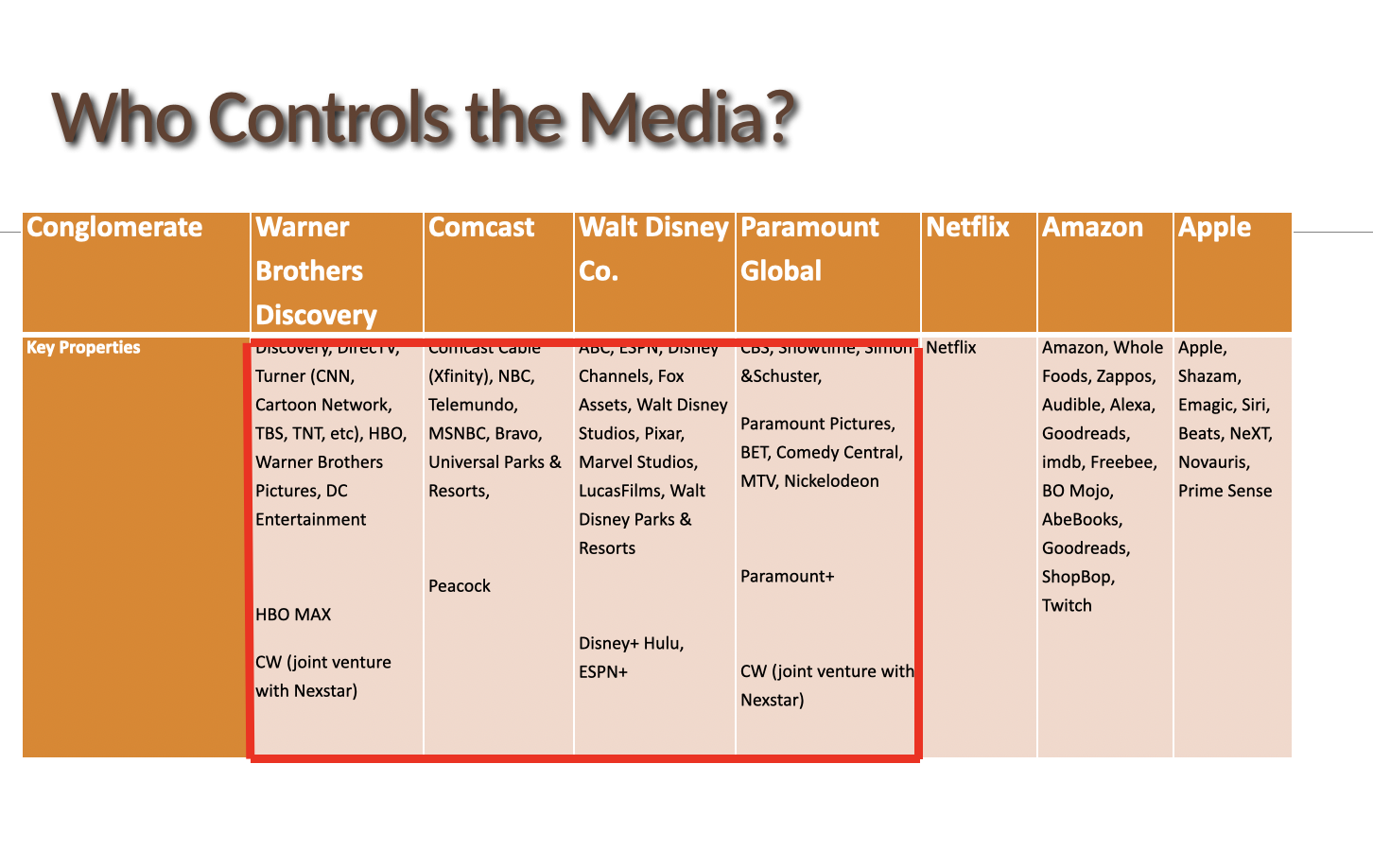
2
New cards
Warner Brothers Discovery (12)
Discovery, DirecTV, Turner (CNN, Cartoon Network, TBS, TNT, etc), HBO, Warner Brothers Pictures, DC Entertainment
HBO MAX
CW (joint venture with Nexstar)
HBO MAX
CW (joint venture with Nexstar)
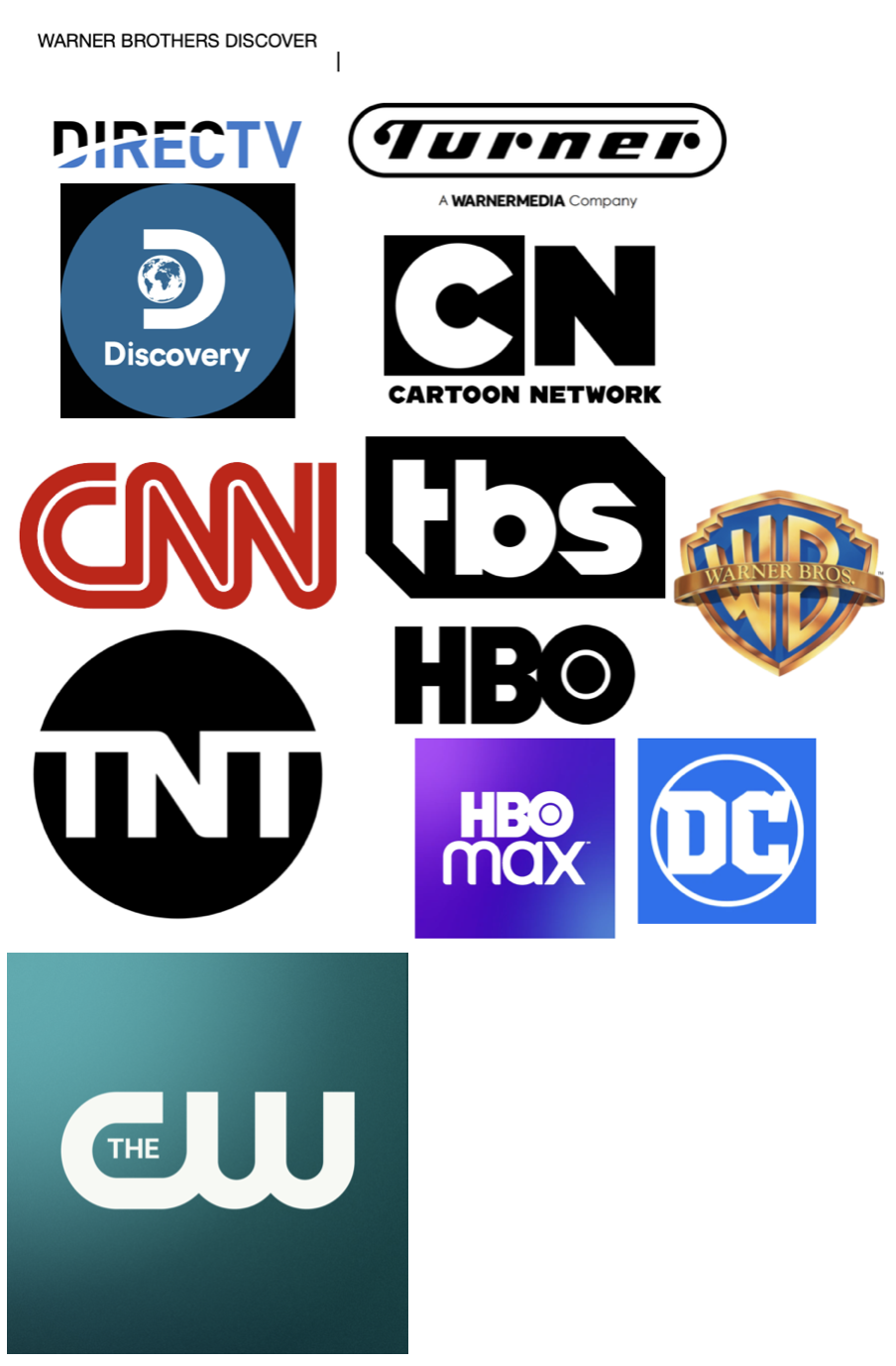
3
New cards
Comcast (7)
Comcast Cable (Xfinity), NBC, Telemundo, MSNBC, Bravo, Universal Parks & Resorts,
\
Peacock
\
Peacock
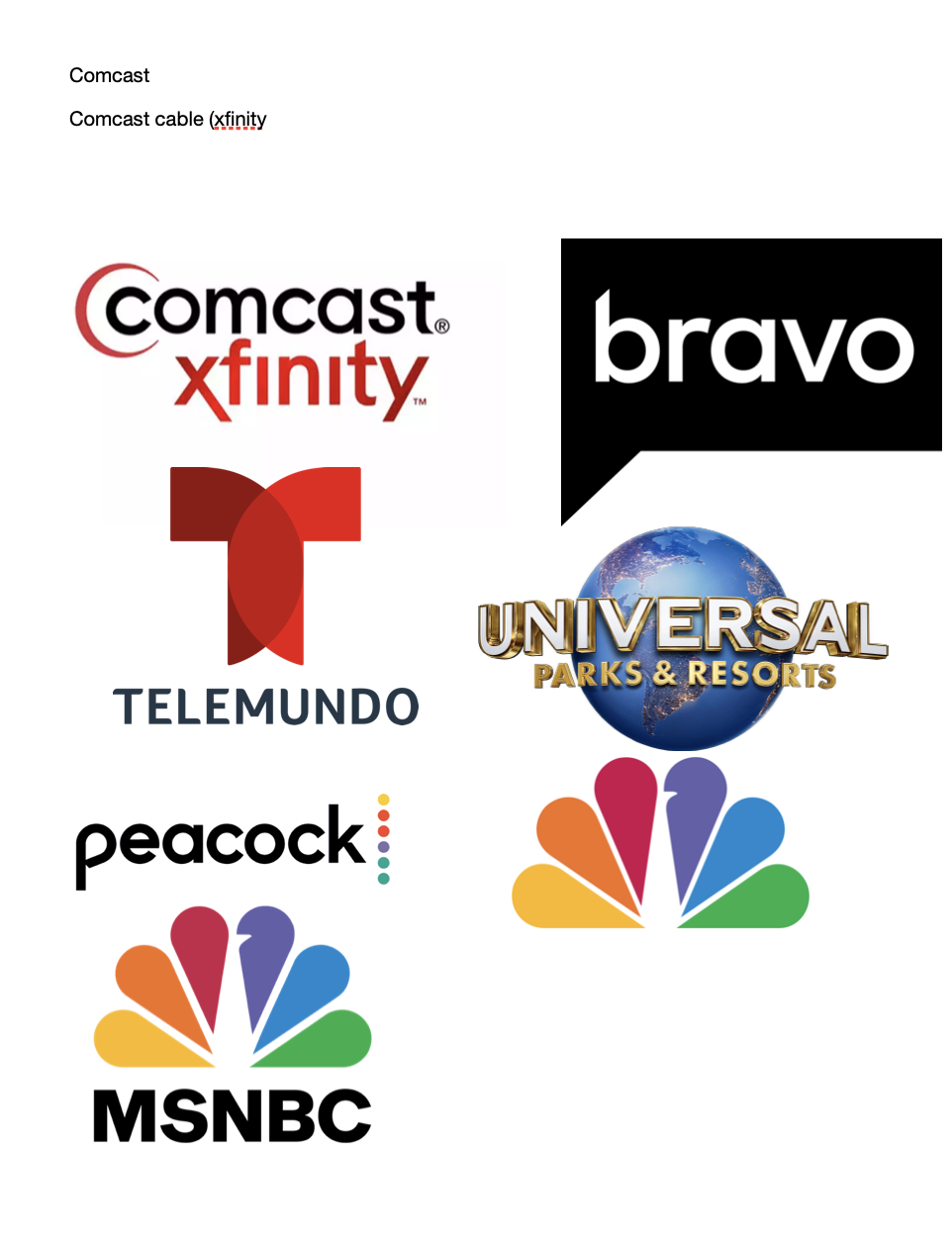
4
New cards
Walt Disney Co. (12)
ABC, ESPN, Disney Channels, Fox Assets, Walt Disney Studios, Pixar, Marvel Studios, Lucas Films, Walt Disney Parks & Resorts
\
Disney+ Hulu, ESPN+
\
Disney+ Hulu, ESPN+
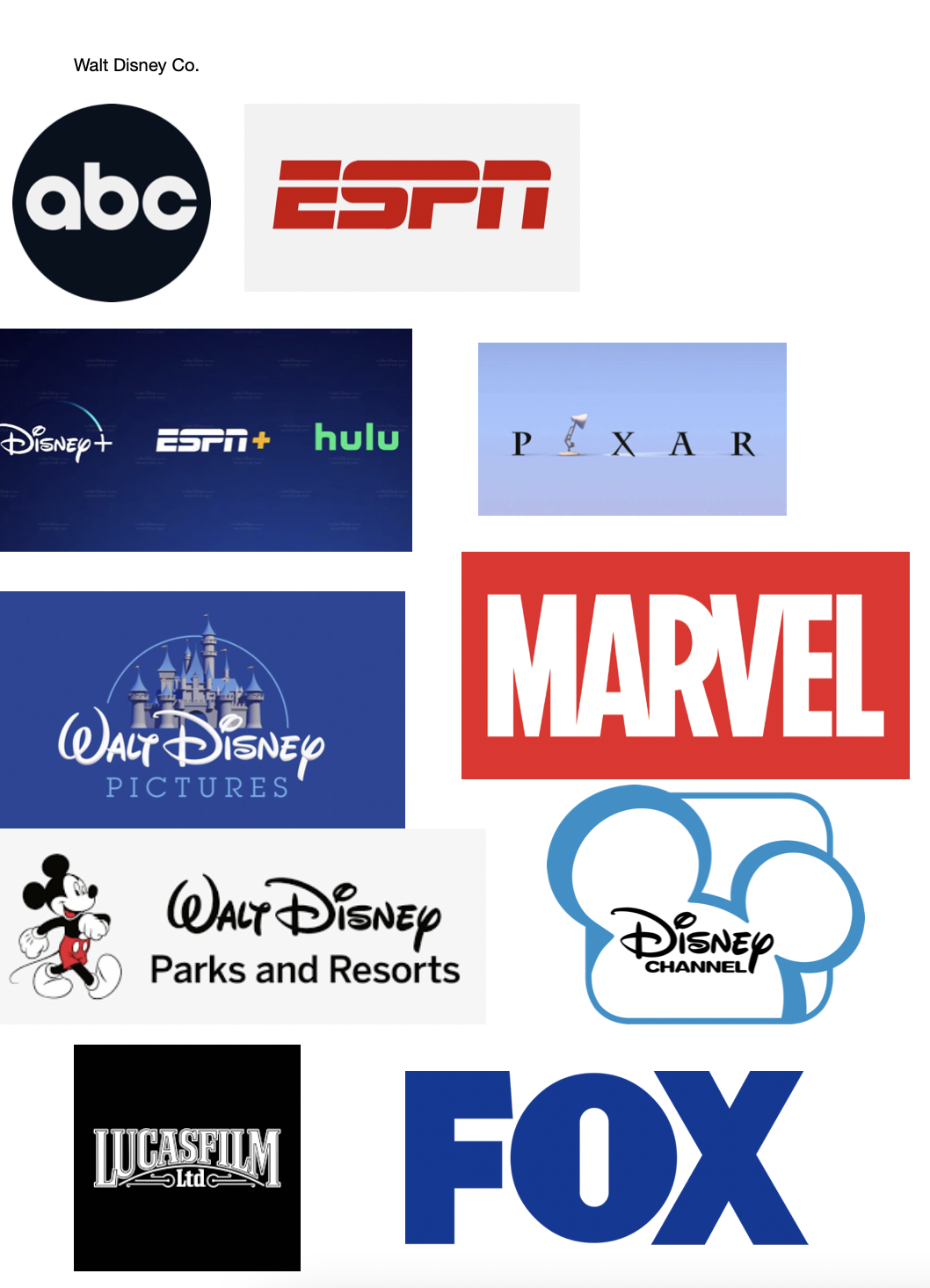
5
New cards
Paramount Global (10)
CBS, Showtime, Simon & Schuster,
Paramount Pictures, BET, Comedy Central, MTV, Nickelodeon
Paramount+
CW (joint venture with Nexstar)
Paramount Pictures, BET, Comedy Central, MTV, Nickelodeon
Paramount+
CW (joint venture with Nexstar)
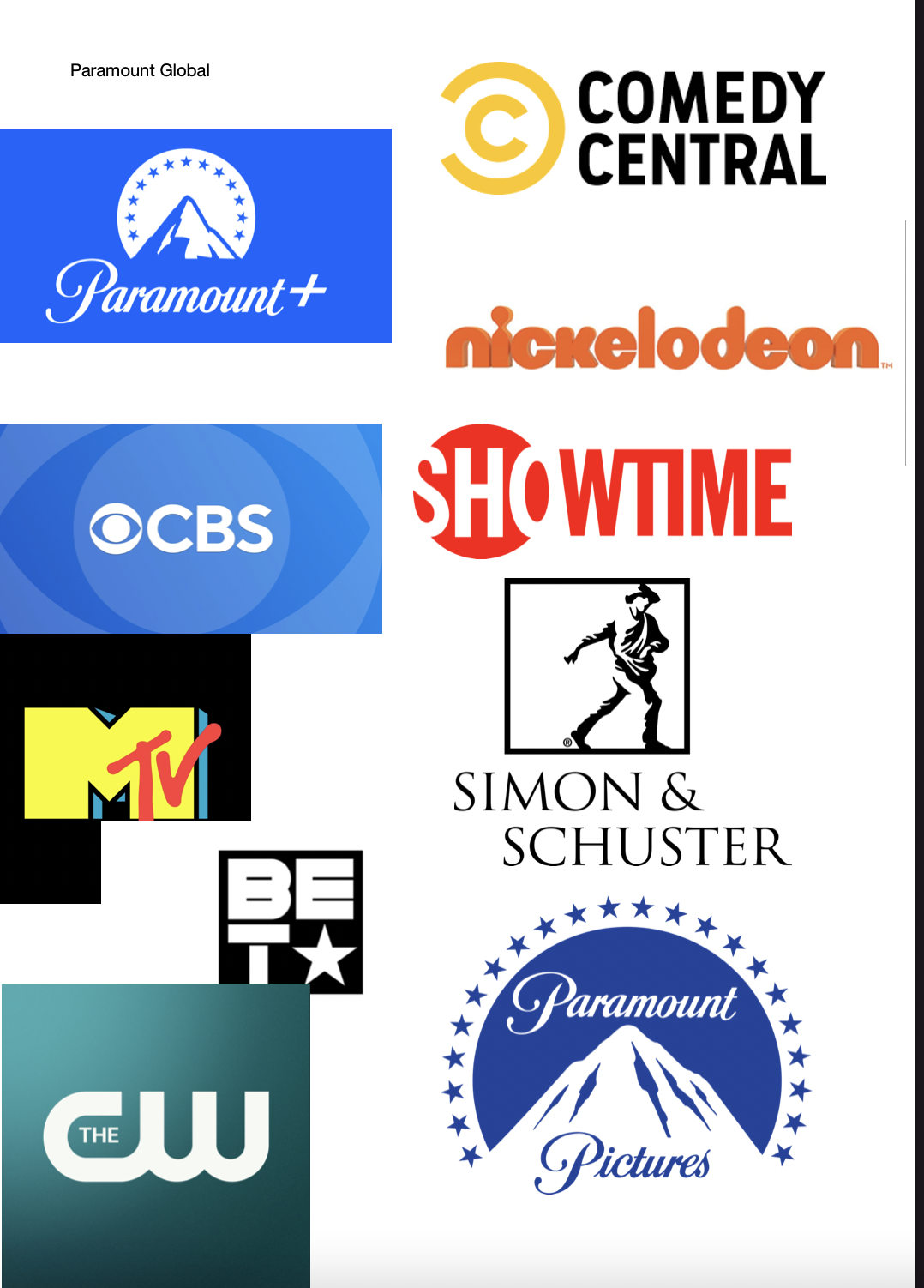
6
New cards
The idea of a Niche Audience
* Particular messages are constructed to appeal to particular people
* These audiences are then rented to advertisers
* Each person is a member of __multiple__ niche audiences
* These audiences are then rented to advertisers
* Each person is a member of __multiple__ niche audiences
7
New cards
Identifying Niches
Geographic Segmentation
Demographic Segmentation
Social Class Segmentation
Psychographic Segmentation
Demographic Segmentation
Social Class Segmentation
Psychographic Segmentation
8
New cards
Geographic Segmentation
* Most important for local TV, newspapers, radio, media that involve geographic boundaries to coverage areas
* Many companies expanded to national distribution, so this segmentation is becoming less useful
* Many companies expanded to national distribution, so this segmentation is becoming less useful
9
New cards
* Demographic Segmentation
* Based on relatively enduring characteristics of audience members
* Gender
* Age
* Ethnicity
* Education
* Income
* Gender
* Age
* Ethnicity
* Education
* Income
10
New cards
* Social Class Segmentation
* Income __and__ psychological characteristics
* Lower class: low income, your fate is not under your control
* Middle class: perspective that you control your fate, make sacrifices now, invest in the long-term
* Upper class: more money, more power, more control over resources
* Lower class: low income, your fate is not under your control
* Middle class: perspective that you control your fate, make sacrifices now, invest in the long-term
* Upper class: more money, more power, more control over resources
11
New cards
Psychographic Segmentation
* VALS Typology
* Uses a wide variety of variables to create its segments, such as demographics, lifestyle, and product usage
* Focus on consumers’ *drives* (ideals, motivators)
* Uses a wide variety of variables to create its segments, such as demographics, lifestyle, and product usage
* Focus on consumers’ *drives* (ideals, motivators)
12
New cards
VALS Typology
Creo q dijo q no importa
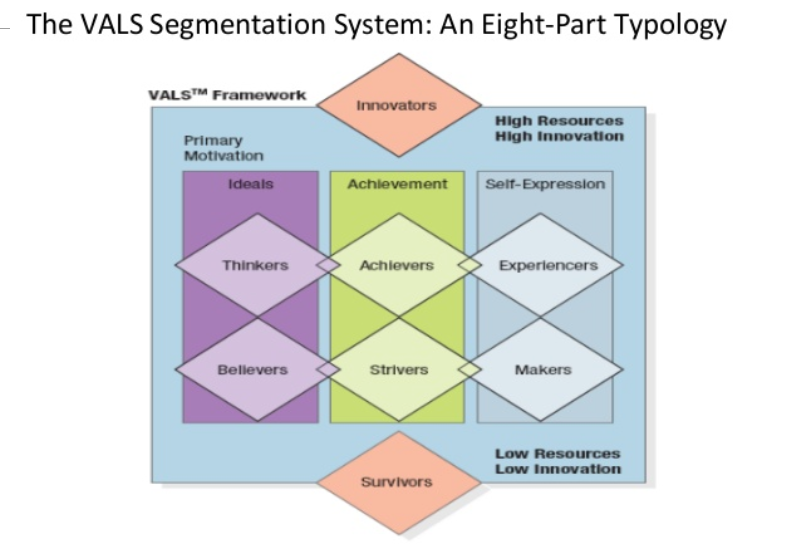
13
New cards
Creating content to attract the target audience
\
* TRACK RECORD
* RESEARCH AND DEVELOPMENT (R & D)
* SURVEYS
* FOCUS GROUP
* ANALYSIS OF EXISTING DATA
\
* TRACK RECORD
* RESEARCH AND DEVELOPMENT (R & D)
* SURVEYS
* FOCUS GROUP
* ANALYSIS OF EXISTING DATA
\
14
New cards
News
* News, like entertainment, involves telling stories. The stories presented in the news are a tale with a beginning, middle and end. JOURNALISTS today must present the news using many forms of media including audio and video reports on the web.
15
New cards
NEWS: Key Idea
*News is* __*not*__ *a reflection of actual events; it is a construction by news workers who are subjected to many influences and constraints.*
Corporate constraints
* Ratings
* Marketing
* Budget
* Who controls editorial decisions?
* Timing
* Deadlines
* Personal/corporate bias
Corporate constraints
* Ratings
* Marketing
* Budget
* Who controls editorial decisions?
* Timing
* Deadlines
* Personal/corporate bias
16
New cards
Subgenres of News
* HARD NEWS
* INVESTIGATIVE REPORTS
* EDITORIALS
* SOFT NEWS
(Know what they are and be able to identify them)
* INVESTIGATIVE REPORTS
* EDITORIALS
* SOFT NEWS
(Know what they are and be able to identify them)
17
New cards
HARD NEWS
* What most people think of as news. It is the firsthand reportage of a battle, the coverage of a congressional bill’s passage, or the details of a forest fire.
* Other important elements associated with hard news are OBJECTIVITY and ACCURACY
* Other important elements associated with hard news are OBJECTIVITY and ACCURACY
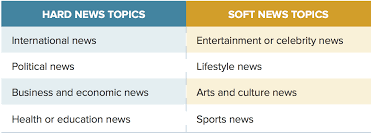
18
New cards
__Four Guidelines that determine what is and isn’t hard news__
1. Timeliness
2. Unusualness
3. Conflict
4. The Closeness of the incident
19
New cards
Quality of news
Truthfulness
* By journalists
* By sources
\
Neutrality
* Lack of bias
* Balance
\
Accuracy
* Truthfulness and neutrality
* Context
* Full story
* By journalists
* By sources
\
Neutrality
* Lack of bias
* Balance
\
Accuracy
* Truthfulness and neutrality
* Context
* Full story
20
New cards
Investigative news
INVESTIGATIVE REPORTS are in-depth explorations of some aspects of reality
\
* Share the same standards of objectivity, fairness and accuracy as hard news
* Difference between hard news and investigative reports is the amount of time journalists devote to the project
\
* Share the same standards of objectivity, fairness and accuracy as hard news
* Difference between hard news and investigative reports is the amount of time journalists devote to the project
21
New cards
Editorials
* A subgenre of news that concentrates on an individual’s or an organization’s point of view
* Columnist: Individuals who are paid to write editorials on a regular basis—usually weekly, monthly, or daily
* BLO==G==S: Journalistic websites or opinion sites in which writings are in the style of journal entries, ==often== in reverse chronological order. (Dijo don’t worry about blogs)
* Columnist: Individuals who are paid to write editorials on a regular basis—usually weekly, monthly, or daily
* BLO==G==S: Journalistic websites or opinion sites in which writings are in the style of journal entries, ==often== in reverse chronological order. (Dijo don’t worry about blogs)
22
New cards
Soft news
The kind of news story that news workers feel may not have the critical importance of hard news but nevertheless would appeal to a substantial number of people in the audience
\
Also known as a human-interest stories
* Examples: cooking, sports, daily life tips, local and community events like plays or recitals
\
Also known as a human-interest stories
* Examples: cooking, sports, daily life tips, local and community events like plays or recitals
23
New cards
Advertising
* An ADVERTISEMENT is a message that explicitly aims to direct favorable attention to certain goods and services
\
* A broad definition of advertising even includes PRODUCT PLACEMENT, which is the paid insertion of products into TV shows and movies in order to associate those products, often quietly, with certain desirable characters or activities
\
* A broad definition of advertising even includes PRODUCT PLACEMENT, which is the paid insertion of products into TV shows and movies in order to associate those products, often quietly, with certain desirable characters or activities
24
New cards
__Subgenres of Advertisements__
* __INFORMATIONAL ADS__
* __HARD-SELL ADS__
* __SOFT-SELL ADS__
* __HARD-SELL ADS__
* __SOFT-SELL ADS__
25
New cards
Vertical integration
An organization’s control over a media product from production through distribution to exhibition
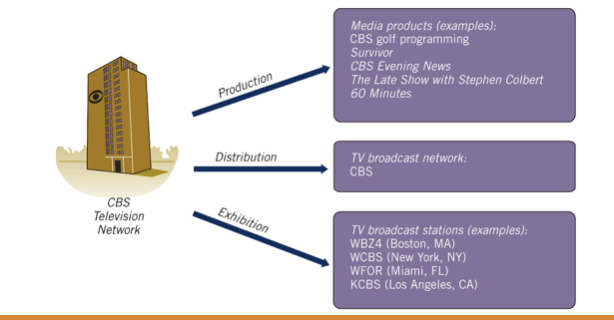
26
New cards
Summary of economic models
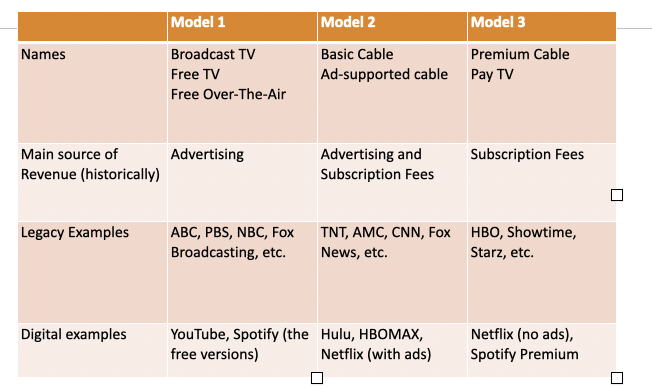
27
New cards
Economic Model: MVPDs
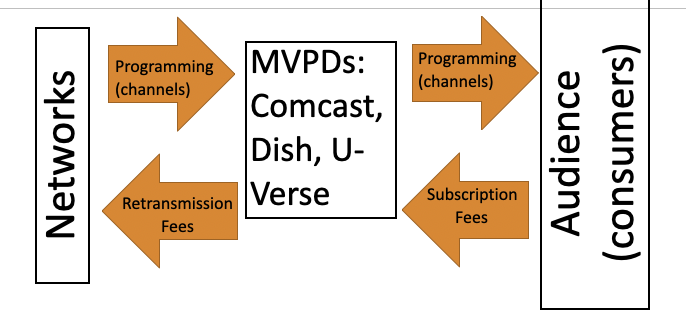
28
New cards
The advertising industry
Advertising
Advertising agencies
Agency holding companies
Advertising agencies
Agency holding companies
29
New cards
ADVERTISING
The activity of explicitly paying for media space or time in order to direct favorable attention to certain goods or services
30
New cards
ADVERTISING AGENCIES
Companies that specialize in the creation of ads for placement in media that accept payment for exhibiting those ads
31
New cards
AGENCY HOLDING COMPANIES
Firms that own full-service advertising agencies, specialty agencies, direct-marketing firms, research companies, and even public relations agencies
32
New cards
CLIENT CONFLICTS
Are situations that occur when agencies serve companies that compete with one another
33
New cards
Ad agencies can be described along four dimensions
1. BUSINESS-TO-BUSINESS vs. CONSUMER AGENCIES
2. GENERAL AGENCIES vs. SPECIALTY AGENCIES
3. TRADITIONAL AGENCIES vs. DIRECT-MARKETING AGENCIES
4. AGENCY NETWORKS vs. STAND-ALONE FIRMS
34
New cards
PRODUCTION in the advertising agency
* ACCOUNT EXECUTIVE
* CREATIVES/CREATIVE PERSONNEL
* MARKET SEGMENTATION
* SALES PITCH
* BRANDING
* CREATIVES/CREATIVE PERSONNEL
* MARKET SEGMENTATION
* SALES PITCH
* BRANDING
35
New cards
Distribution in the advertising industry
* MEDIA PLANNERS
* PSYCHOGRAPHIC DATA
* MEDIA PLAN
* IN-STORE MEDIA
* COST PER THOUSAND (CPM)
* PSYCHOGRAPHIC DATA
* MEDIA PLAN
* IN-STORE MEDIA
* COST PER THOUSAND (CPM)
36
New cards
Public Relations
Publicity
Media Relations
Media Relations
37
New cards
PUBLICITY
The process of getting people or products mentioned in the news and entertainment media in order to get members of the public interested in them
38
New cards
MEDIA RELATIONS
All dealings with reporters and other members of media organizations who might tell a story about a client
39
New cards
Prominent Public Relations Activities
* Corporate Communications
* Financial Communications
* Health Care
* Public Affairs
* Crisis Management
* Financial Communications
* Health Care
* Public Affairs
* Crisis Management
40
New cards
* INTEGRATED MARKETING COMMUNICATION (IMC)/MARKETING COMMUNICATION –
* Advertising (Marketing) is expensive while PR (Communication) is not, integrating the two results in IMC
* Definition: A type of PR, the goal of which is to blend (integrate) historically different ways to communicate to an organization’s various audiences and markets
* Definition: A type of PR, the goal of which is to blend (integrate) historically different ways to communicate to an organization’s various audiences and markets
41
New cards
Types of Marketing communications
* Branded Entertainment
* Event Marketing
* Event sponsorship
* Product placement
* Direct Marketing
* Relationship Marketing
* Event Marketing
* Event sponsorship
* Product placement
* Direct Marketing
* Relationship Marketing
42
New cards
BRANDED ENTERTAINMENT
The act of linking the firm or product’s name (and personality) with an activity that the target audience enjoys
43
New cards
Marketing Communications
1) Event Marketing: creating compelling circumstances that command attention in ways that are relevant to the product or firm
2) Event Sponsorship: range from simple logos at sporting events, for example, to sponsoring of entire events
3) Product Placement:
Barter: no cash exchanged, only good and/or services
Paid: Product integration
Different prices depending on exposure or level of “integration” of product
2) Event Sponsorship: range from simple logos at sporting events, for example, to sponsoring of entire events
3) Product Placement:
Barter: no cash exchanged, only good and/or services
Paid: Product integration
Different prices depending on exposure or level of “integration” of product
44
New cards
Media convergence
Lines between advertising and PR are sometimes blurry
Experts have divided communication into three categories:
* Paid media
* Owned media
* Earned media
Experts have divided communication into three categories:
* Paid media
* Owned media
* Earned media
45
New cards
7 dirty words by George Carlin
shit, piss, fuck, cunt, cocksucker, motherfucker and tits